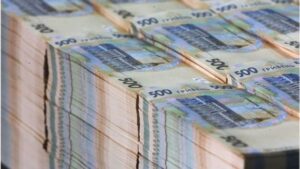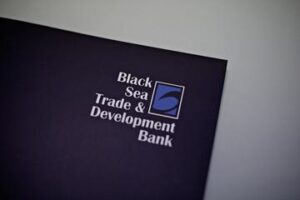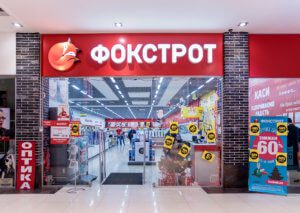
The portfolio of domestic government bonds (OVDP) held by Ukrainian banks decreased by UAH 3.584 billion (0.4%) to UAH 912.852 billion, while that held by non-residents decreased by UAH 0.181 billion (1.2%) to UAH 15.446 billion.
The OVDP portfolio owned by legal entities increased by UAH 2.073 billion (1.1%) to UAH 190.889 billion, and that of individuals by UAH 0.288 billion (0.3%) to UAH 106.790 billion.
According to the NBU, the overall OVDP portfolio decreased by UAH 1.449 billion (0.1%) to UAH 1,895.060 billion from UAH 1,896.509 billion a day earlier, while the portfolio owned by the NBU and local authorities remained unchanged.
The official exchange rate on November 6 was UAH 42.0671/USD.

The Dutch Development Bank (FMO) has reduced the value of its portfolio in Ukraine by EUR200 million, including direct investments – by EUR70 million, loans – by EUR90 million, according to a press release from the bank.
“In Ukraine, we provided financing mainly to agro-industrial companies and the renewable energy sector. After the Russian invasion of Ukraine, FMO published in its annual report that the direct impact on Ukraine amounted to about EUR200 million under contracts with 14 clients,” the message says.
It is indicated that this risk falls on debt products (56%), equities (37%) and guarantees (7%).
“The adjustments reflect management’s updated expectations for revenue and investment recovery impacted by the war in Ukraine,” FMO said.
In addition, the financial institution has indirect risks in Ukraine through borrowed funds in the amount of EUR14 million.
The bank stressed that it has no direct contact with Russia, and the assessment of its portfolio in Belarus has been reduced by about EUR20 million, mainly in the form of capital.

The Black Sea Trade and Development Bank (BSTDB, Thessaloniki) intends to achieve an annual increase in the value of its portfolio by 5-7% in 2021-2030 and increase its volume to EUR 4 billion from the current approximately EUR 2.3 billion, President of the bank Dmitry Pankin told reporters at the conference in Thessaloniki (Greece), which takes place on August 27-28.
“In June 2021, the bank approved a long-term strategy for 2021-2030. Among the goals are signing 30-35 projects per year, increasing commitments (on projects) for the year to EUR 1.7 billion from the current EUR 800 million, in order to achieve EUR 12 billion,” Pankin said.
The President also said that in the face of lower interest rates and increased availability of borrowed funds in most markets where the bank operates, the BSTDB also decided to strengthen its potential for generating projects and subsequently organizing their financing and become a cheaper competitor to leading consulting companies and investment banks.
“Traditionally, development banks have offered long-term cheap financing, but now everyone is ready to provide it. Therefore, our 10-year strategy involves reorienting the bank to a project organizer, a provider of feasibility studies and risk calculation,” Pankin explained.
He added that, unlike consulting companies, BSTDB is ready to take risks in such projects.
In connection with this new strategy, the bank will hire specialists of appropriate qualifications, as well as people for the potential sale of part of the portfolio in order to free up capital for new operating activities, which will also become new in the work of the BSTDB, the president of the bank said. According to him, the BSTDB intends to become more active in marketing and in the search for new projects, whereas clients themselves come to him more often today.
Talking about other institutional goals of the new strategy, Pankin said that the bank would continue to maintain a diversified and balanced portfolio of operations with a public sector share of about 30%, more actively connect to the fast-growing class of “green” investors and remain open to new shareholders – sovereign states and development institutions.
The BSTDB President recalled that member states of the Black Sea Economic Cooperation Organization (BSEC) may become the bank’s shareholders. Since 2014, Serbia has become a member of the BSEC, which has not yet participated in the bank, and since 2021 – Macedonia. According to Pankin, discussions and negotiations are underway with them, but they are still far from over.
Within the framework of the medium-term strategy for 2019-2022, the BSTDB puts an aim of an annual growth of more than 12% and exceeding EUR 2.5 billion of the portfolio at the end of the period, promoting the export of goods and services with a focus on small and medium-sized enterprises, with a special focus on the real economy and infrastructure, including energy, transport and communal infrastructure.
In 2020, the bank signed projects for EUR 624 million, and allocated EUR 785 million for them and for previous projects, increasing the portfolio by 12%. Net profit increased to EUR 14.2 million from EUR 13.7 million in 2019, and the share of bad loans in the bank’s balance sheet is 0.2%.
BSTDB is an international organization uniting 11 states of the Black Sea Economic Cooperation organization. The shares of Turkey, Russia and Greece in the capital are 16.5% each, Romania – 14%, Ukraine and Bulgaria – 13.5% each, Azerbaijan – 5%, Albania – 2%, Armenia – 1%, Georgia and Moldova – each 0.5%. The bank aims to promote economic cooperation, trade and cooperation of the countries of the Black Sea region. The bank’s paid up authorized capital is EUR 0.69 billion, and its long-term credit ratings are “A-” from S&P and “A2” from Moody’s.
The Bank provides medium and long-term corporate loans for up to 10 years, and for project financing – up to 15 years. In the case of the private sector, the volume of a loan can be up to EUR 90 million, for the public sector – EUR 120 million.
At the end of 2020, the largest volume of BSTDB projects was in Turkey – 23.14%, followed by Greece – 18.38% and Russia – 15.6%, while Ukraine accounted for 11.62%, Bulgaria – 7.58%, and Romania – 5.86%.
They were followed by Azerbaijan – 5.09%, Georgia – 4.88%, Armenia – 4.4%, Moldova – 1.77%, and Albania – 1.67%.

The loan portfolio of banks in July-August 2020 increased by 3%, while in the first half of the year it decreased by 5%, Governor of the National Bank of Ukraine (NBU) Kyrylo Shevchenko has said.
“In July and August, the banks really lent to the population much more actively than in the first half of the year. Indeed, in the first half of the year we saw a reduction in the loan portfolio by 5%. In the two months, the portfolio grew by about 3%,” he said during a press briefing by the National Bank.
According to him, over the past three months, the banks have lowered lending rates, in particular, rates on loans for businesses are below 10%, while in the first half of the year the average rate on such loans was 11%.
“Regarding the rates for the population, unfortunately, there is no such a trend, with the exception of rates on mortgage loans. Rates on mortgage loans are average, if we started the year at a level of almost 20%, then in July they were about 13% and in August we expect average rates on mortgage loans to be even lower,” Shevchenko added.
In addition, he noted a decrease in the volume of non-performing loans (NPL), in particular, over the past two months, their share decreased by 1.5%, excluding the revised statistics for August.

The portfolio of government domestic loan bonds held by non-residents as of July 4 reached a new historical record high of UAH 60.12 billion at face value, including an increase of UAH 2.71 billion following the results of primary auctions conducted on July 2.
According to data released by the National Bank, the entire increase was traditionally provided by hryvnia securities, by UAH 3.91 billion, which total UAH 58.21 billion in the portfolio held by non-residents.
Such an inflow of funds from non-residents allowed the National Bank to buy out $52 million in the market after primary auctions on July 3, although the hryvnia exchange rate strengthened and for the first time since April 2018 it overcame the level of UAH 26/$1.
A week earlier, the portfolio of government bonds owned by non-residents grew by UAH 4.79 billion, but then a small part of it (UAH 390 million) was secured by equities in U.S. dollars.
In general, since the beginning of 2019 the portfolio of government bonds owned by non-residents has increased by UAH 53.77 billion, or 9.5 times.

Depot Development Group from the Foxtrot Group (Kyiv), developing the Depo’t shopping centers chain in Ukraine, plans to expand the portfolio of retail property in Ukrainian regions via acquisition of finished facilities and building new ones, Foxtrot Group Head Valeriy Makovetsky has said.
“We have several construction projects and a number of projects for expanding/restyling existing facilities,” Makovetsky said in an exclusive interview with Interfax-Ukraine.
At the same time, he said that the group does not plan to build a shopping center in Kyiv, since this is a specific market “with a long and not very high return on invested capital.”
“We have another strategy: construction of commercial real estate in the regions of Ukraine. We are trying to acquire completed and, from our point of view, liquid, small facilities. Next year [2019] we have planned the construction of a good facility in the center of Chernihiv. We are currently developing a restyling project of our facility in Kryvy Rih. We are attaching a sports complex with a swimming pool for the Sportlife network. We are planning to reformat the shopping center in Zaporizhia, to expand our shopping center in the center of Kropyvnytsky. Maybe, we will take part as partners in one of the Kharkiv facilities,” Makovetsky said, describing the plans.
According to him, these will be small regional-scale shopping centers, the total area of each of them will be about 10,000-15,000 square meters.
As Makovetsky said, Depo’t shopping centers show good performance, so the issue of selling them is not on the agenda.
“This business demonstrates good efficiency. The facilities stably show profits. Rental rates this year have grown by about 30%. Therefore, we plan to develop this area of business and the issue of selling them is not on the agenda,” the head of the Foxtrot Group said.